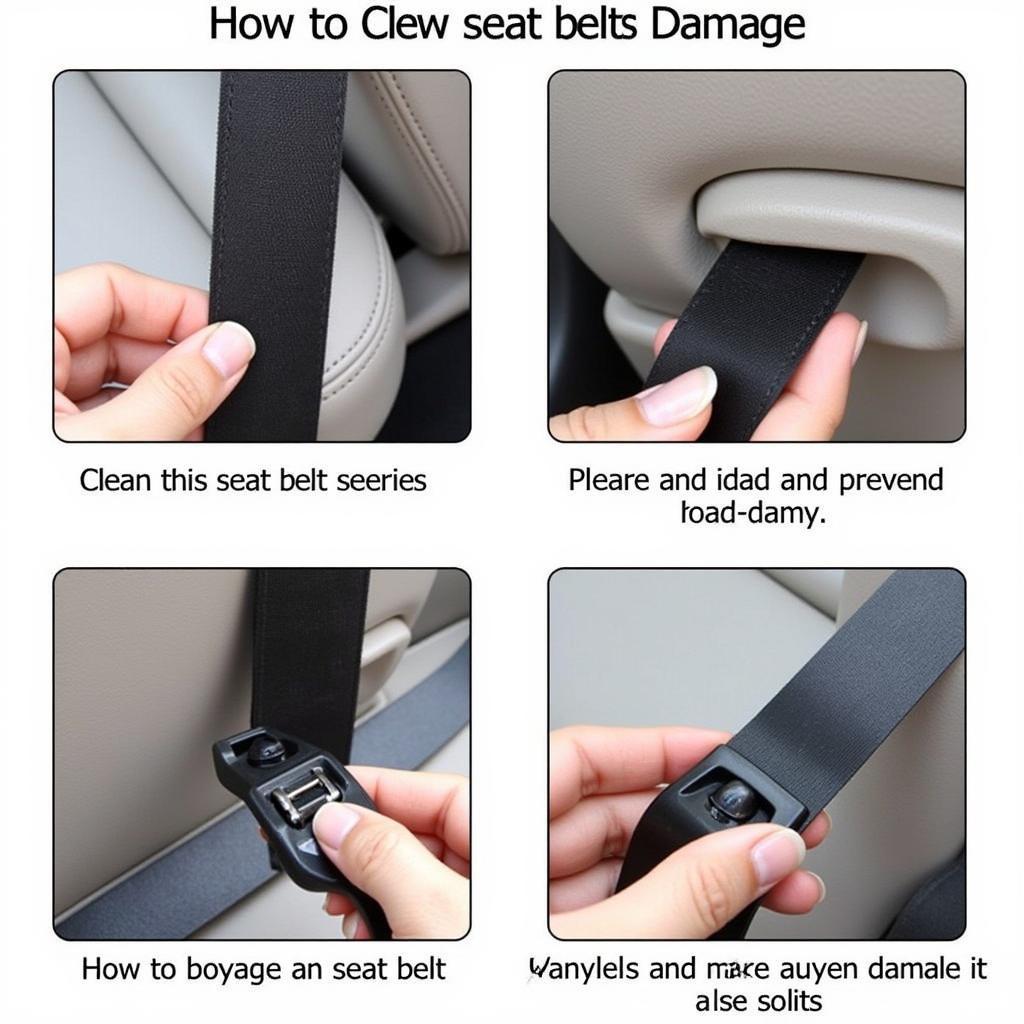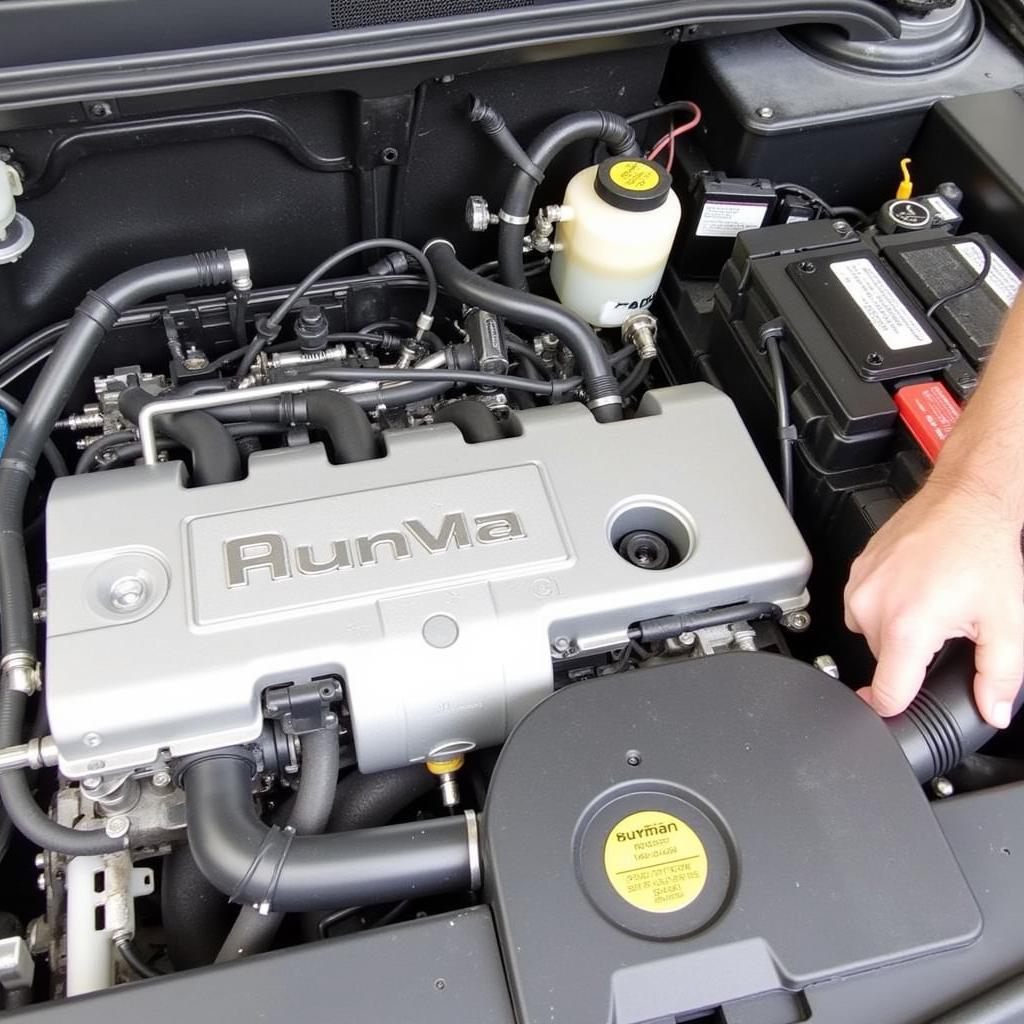The brake light warning light on your BMW 1 Series dashboard is a crucial safety feature that should never be ignored. When illuminated, it signals a potential issue with your braking system that requires immediate attention. This comprehensive guide will delve into the common causes of this warning light, how to diagnose the problem, and potential solutions.
Understanding Your BMW’s Brake Warning System
Modern BMWs, including the 1 Series, are equipped with sophisticated electronic systems that monitor various components. When it comes to brakes, the warning light can be triggered by a range of factors, from worn brake pads to more serious issues like low brake fluid or a malfunctioning ABS system.
Common Causes of a BMW 1 Series Brake Light Warning
1. Worn Brake Pads
The most common culprit behind a brake light warning is worn brake pads. Over time, brake pads thin out due to friction generated during braking. Most BMWs include wear sensors in the brake pads that trigger the warning light when they reach a critical level.
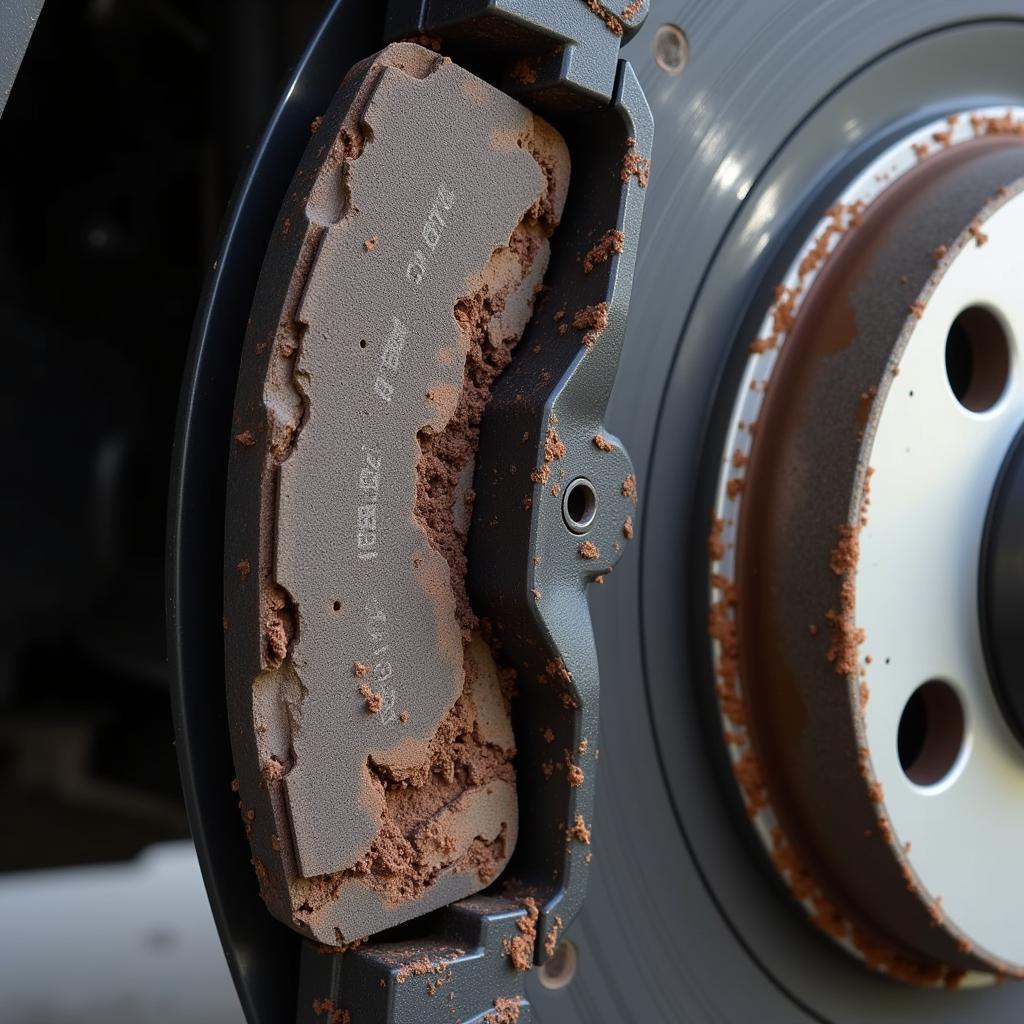 Worn Brake Pads BMW 1 Series
Worn Brake Pads BMW 1 Series
2. Low Brake Fluid
Brake fluid is the lifeblood of your BMW’s braking system, transmitting hydraulic pressure from the master cylinder to the calipers, activating the brakes. A drop in brake fluid level can significantly impact braking performance and is often a sign of a leak in the system.
3. Faulty Brake Light Switch
The brake light switch is a small but vital component that activates your brake lights when you press the pedal. A malfunctioning switch can lead to the brake lights not illuminating properly, triggering the warning light.
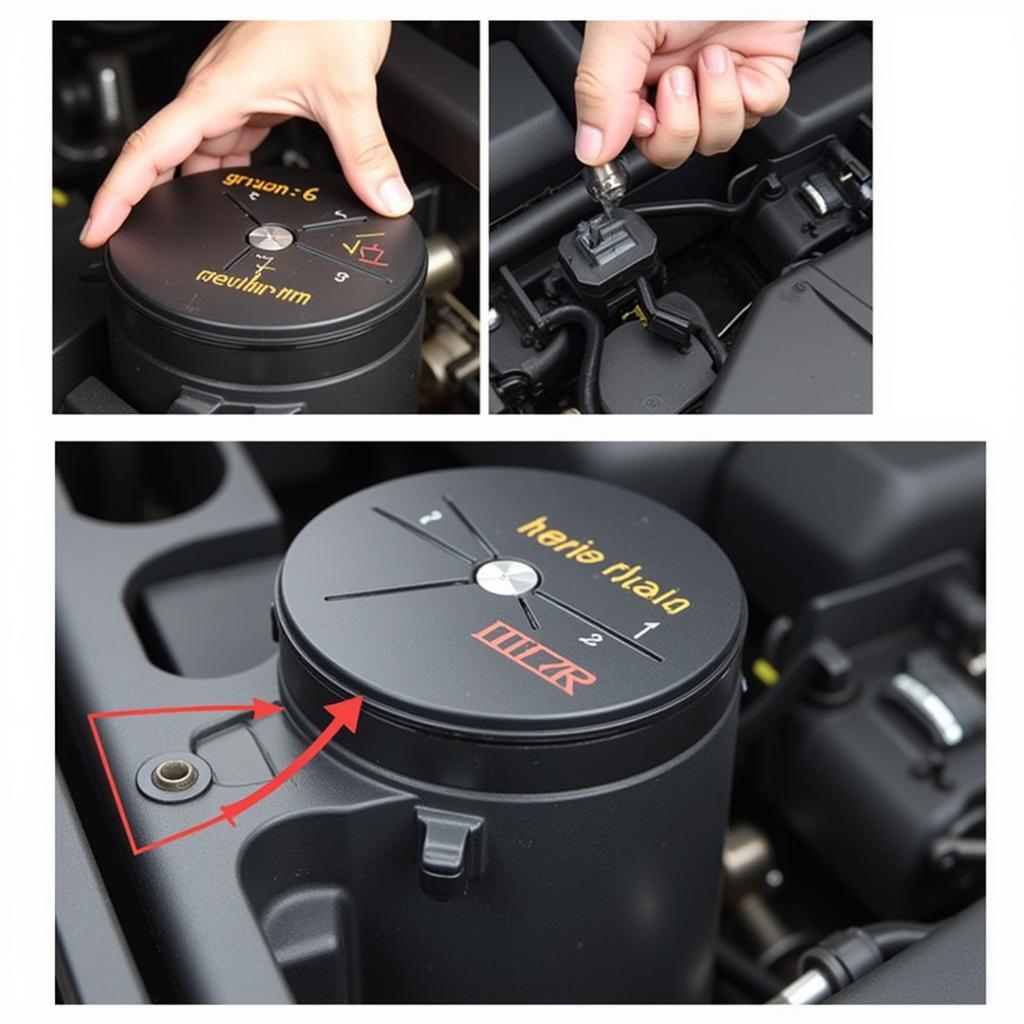 Checking Brake Fluid Level BMW 1 Series
Checking Brake Fluid Level BMW 1 Series
4. ABS Issues
The Anti-lock Braking System (ABS) prevents wheels from locking up during hard braking, maintaining steering control. If the ABS control module detects a problem, it can trigger the brake light warning light.
5. Electrical Malfunctions
Like any electronically controlled system, the braking system in your BMW 1 Series relies on sensors and wiring. A short circuit, broken wire, or faulty sensor can disrupt the system, leading to the warning light appearing.
Diagnosing the Brake Light Warning Light
Determining the exact cause of the warning light often requires further investigation.
Here’s what you can do:
- Check your brake fluid level. A low fluid level is a serious issue and should be addressed immediately.
- Inspect your brake pads. If you can see the pads through the wheel spokes, visually assess their thickness.
- Listen for unusual noises. Screeching, grinding, or clicking sounds when applying the brakes can indicate worn brake pads or other brake system problems.
- Feel for changes in brake pedal feel. A spongy or soft brake pedal can be a sign of air in the brake lines or a failing master cylinder.
When to Seek Professional Help
While some issues can be addressed with basic DIY maintenance, it’s generally recommended to consult a qualified mechanic, especially if:
- You’re uncomfortable working on your vehicle’s braking system.
- You suspect a leak in the braking system.
- The brake warning light remains on after checking fluid levels and inspecting the brake pads.
- You experience any unusual behavior while braking, such as pulling to one side or a vibrating brake pedal.
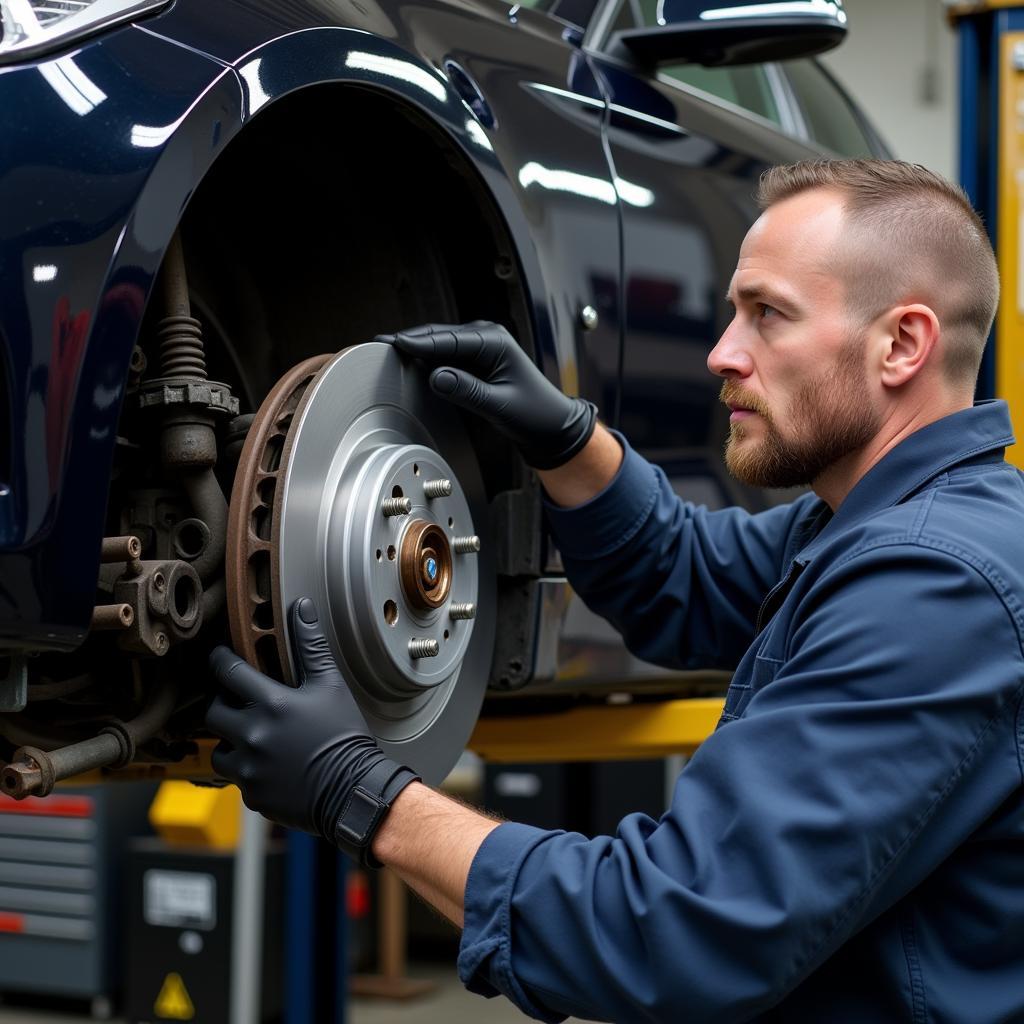 Mechanic Inspecting BMW 1 Series Brakes
Mechanic Inspecting BMW 1 Series Brakes
Resolving the Brake Light Warning
The solution to your BMW 1 Series’ brake light warning light depends entirely on the root cause. Here are some common solutions:
- Replacing Worn Brake Pads: Worn brake pads should be replaced immediately to ensure safe and optimal braking performance.
- Addressing Brake Fluid Leaks: Locating and repairing brake fluid leaks is crucial. This may involve replacing damaged brake lines, hoses, calipers, or the master cylinder.
- Replacing the Brake Light Switch: A faulty brake light switch is a relatively inexpensive part to replace and can often be done at home with basic tools.
- Repairing or Replacing ABS Components: Issues with the ABS module or sensors may require professional diagnosis and repair or replacement of faulty components.
- Addressing Electrical Issues: Troubleshooting electrical malfunctions within the braking system necessitates specialized knowledge and tools.
BMW 1 Series Brake Light Warning: Don’t Ignore It
The brake light warning light is a critical safety feature in your BMW 1 Series. Addressing any underlying issues promptly can prevent further damage to your braking system and ensure your safety on the road.
Expert Insight from Michael Thompson, Certified BMW Technician:
“The braking system is arguably the most critical safety feature in your vehicle. Ignoring warning signs like the brake light can have serious consequences. Regular maintenance and timely repairs are essential.”
FAQs
Q: Can I still drive my BMW 1 Series with the brake light warning on?
A: It’s strongly discouraged. While you might still have some braking ability, continuing to drive with a compromised system puts you and others at risk.
Q: How often should I replace my BMW 1 Series brake pads?
A: Brake pad lifespan varies greatly depending on driving style and conditions. As a general guideline, consider inspection every 15,000 miles and replacement between 30,000 to 70,000 miles.
Q: How much does it cost to fix a BMW 1 Series brake light warning?
A: Costs depend on the underlying problem. Simple fixes like replacing brake pads or the brake light switch are relatively inexpensive. However, issues with the ABS system or major leaks can be significantly more costly.
Q: How can I prevent future brake light warnings?
A: Adhering to a regular maintenance schedule, including brake fluid flushes, inspections, and timely component replacement, can significantly reduce the likelihood of encountering brake system problems.
Q: Is it safe to add brake fluid myself?
A: While topping off brake fluid is possible, it’s crucial to use the correct DOT specification recommended for your BMW 1 Series and to address any underlying leaks causing the low fluid level.
Remember, your safety is paramount. If you’re ever unsure about your BMW 1 Series’ braking system, consult a qualified mechanic for a professional diagnosis and repair.


